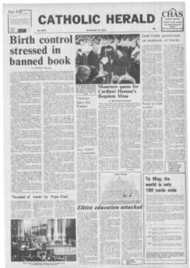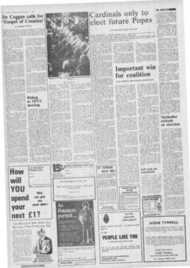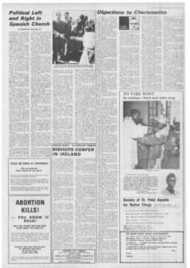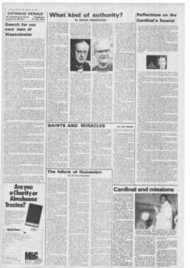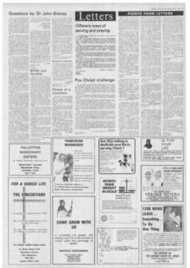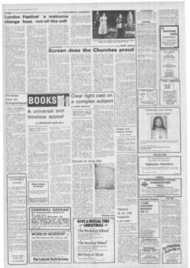Page 1, 21st November 1975
Page 1

Report an error
Noticed an error on this page?If you've noticed an error in this article please click here to report it.
Tags
Share
Related articles
Overpopulation A Myth
Are We To Wither Into A Dead World?
Vatican Changes Mind On Banning Population Book
London Labour Daily Banned For Advocacy Of Contraception
Vatican Bans Book After 17 Years
Birth control stressed in banned book
by PETER NOLAN
A new book on the population problem that the Vatican attempted to ban and later censored was published in full in London yesterday. The book contains no statement opposed to Papal teaching and Humanae Vitae, the encyclical on individual morality and birth control, but it places the whole question of responsible parenthood firmly in the context of increasing world population.
"The Population Problem*" was written at the request of the Conference of International Catholic Organisations, many of whom have consultative status at the United Nations. Though closely linked with the Vatican, the CICO is an independent organisation to which many British Catholic groups are affiliated, including the Catholic Marriage Advisory Council and the Guild of Catholic Doctors.
The book, shortly to be published in Italian and Spanish, is certain to spark off a new debate on family planning throughout the Church.
Edited by Fr Michael Ingram OP of Holy Cross Priory, Leicester, and Canon Joseph Moerman of the International Catholic Child Bureau in Geneva, it was first banned by the Vatican Secretary of State, Cardinal Villot, then allowed to appear in a censored French edition last February.
The section cut from the French edition, on moral and religious considerations, is restored in the English edition. This section was prepared by Fr Ingram, a child psychologist; Dr Jack Dominian, a psychiatrist; Dr John Marshall, a gynaecologist; Dr Pierre Delooz, a Belgian professor of Sociology; and Fr John Harriott Si.
The book, divided into four sections on Demography, Health, Sociology and Ethics, was prepared by 20 Catholic experts, many with international reputations, in consultation with 50 others throughout the world, Drafts were sent out to CICO organisations and note taken of all criticisms in the two years it took to write the 150 page work. Fr Ingram, speaking from Geneva where he is Chaplain to the English Community, said, "It is certainly not an attack on Humanae Vitae, it is an interpretation of it."
He said the abbreviated French edition had caused little debate in France so far but this would change when the new edition was published. "The Vatican think they have killed it," he said, adding that he was afraid the Vatican would "over-react" to the new publication.
It is understood that a particular interpretation of Humanae Vitae is currently being used as a test of orthodoxy by Vatican officials.
Last minute changes in the membership of the Vatican delegation to the World Population Conference in 1974 are believed to have been made on the basis of whether representatives fully assented to a particular interpretation of Humanae Vitae without any reservations. Vatican representatives who were present at all major meetings of the CICO population commission, at one point tried to stifle discussion of Humanae Vitae, the publishers said in the introduction to the English edition.
A Vatican representative said there was only one official interpretation and refused to allow a sub-committee of theologians to be formed to advise on the subject.
"But it was impossible to ignore the problem: full respect for the teaching of the Holy See was maintained, but discussion of the topic appeared in the documents," the introduction said.
Fr Ingram said the work of the population group was under continual pressure from the Vatican and the publishers introduction states that a copy of "a secret directive to hierarchies throughout the world, urging them to put pressure on their governments to make sure that laws concerning birth control were not liberalised. was given secretly to the president of the Conference (of International Catholic Organisations) to persuade him to ensure that the population commission took the same line."
In the first part of the book on demographic aspects of population, Fr Arthur McCormack, a British Mill Hill Father and population expert, spells out the implications of continually increasing population.
"The Catholic Church and especially lay organisations, must face up to the fact that the world is confronted with a serious and urgent situation," he said.
In a world where population "is expected to double" in 30 years, he emphasised population policy could only be part of a total development policy and would differ from area to area.
Canon Pierre DeLocht, looking at the ethical implications of population, noted the ability to plan family size, the increasing inter-dependence of all countries on one another and the moral diversity of a world which could not be divided into watertight compartments were all new aspects of the problem. He said, "So many new realities and meanings do not allow an assessment of the present only in terms of the answers given by our forbears . . . the perpetual rejuvenation of humanity requires more than the handing down of moral principles from generation to generation." Rather than trying to force Catholic ethics on everyone, which would only result in a trial of strength, we should "institute a permanent dialogue in order to identify, at the heart of all different views, a common core on which it is possible to base joint work," he said.
This would be possible without watering down our own beliefs. Such work would "make possible some lines of common human progress," he said. It is impossible to summarise such a closely reasoned, carefully written book, but there is no doubt it suggests new and worthwhile possibilities for the Universal Church in facing up to the greatest social problem of our time, the population explosion.
"TAI Papule:How Problem, Search Press £1.95.
blog comments powered by Disqus


